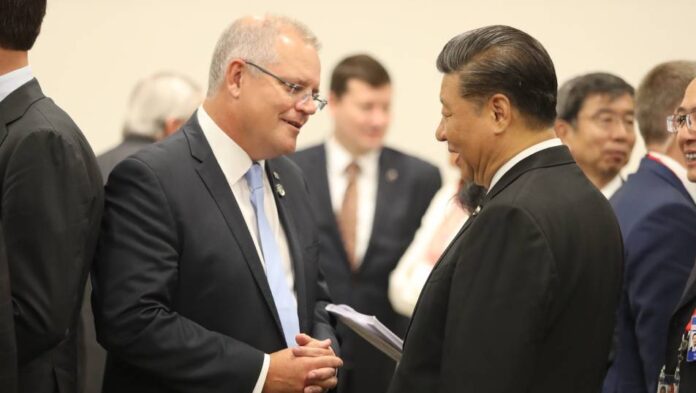A new stage of hostility has opened in the strained relationship between the Australian and Chinese governments. At a time when international cooperation is needed more than ever, Canberra and Beijing are engaged in a game of escalating threats and political-economic punches.
Tensions flared in May when Scott Morrison and Foreign Minister Marise Payne led calls for an international inquiry into the origins of the COVID-19 outbreak. This demand, implicitly offering credence to US President Donald Trump’s accusation that the virus was engineered in a Wuhan lab, prompted a furious response from the Chinese Communist Party.
China retaliated by halting beef imports from four major Australian abattoirs and slapping an 80% tariff on imports of Australian barley. These measures were a warning shot. The warning couldn’t have been any clearer in an article from one of the Chinese regime’s mouthpieces, the Global Times newspaper: if Australia supports the US in a new Cold War, China would deliver its economy a “fatal blow”.
Relations worsened in June. Morrison refused to step back from the Australian government’s provocative rhetoric. In a further escalation the Chinese government issued warnings to international students and tourists, advising them to reconsider travel after a string of racist attacks targeting Asian people. This did not stem from any genuine concern about racism, which the regime itself freely employs against Uyghurs and other ethnic minorities in China. It was a calculated hit to tourism and education, two of Australia’s key exports.
These developments are a crisis for Australia’s ruling class, which is trying to maintain its position in an increasingly fraught geopolitical landscape. After decades of free trade orthodoxy, exemplified by bodies like the World Trade Organisation, decades old rules and institutions of globalised capitalism are breaking down. Accelerated by the pandemic, ruling elites are turning inwards, reverting to nationalism and protectionism.
Taking centre stage in this conflict is China’s ambition to supplant the US as the world’s foremost imperialist power. Unlike the Cold War of the 20th century, this is not a battle of systems or ideologies, but a naked struggle for dominance between the world’s two largest capitalist powers. The US, desperate to reverse its own relative decline, is ratcheting up pressure on its allies to deepen mutual political, economic, technological and military ties.
Australian imperialism is in a difficult position. While the alliance with the US runs deep, China is Australia’s biggest trading partner, accounting for 38% of exports in 2019. This gives it massive leverage over the profits of Australia’s ruling class. Mining, agriculture, construction, tourism and education capitalists all rely heavily on maintaining this relationship.
An all-out trade war with China is a real possibility. If this occurs, the consequences for working class people would be catastrophic. Job losses would take place on a scale greater than the initial COVID-19 shutdown. Working people need to get organised now and prepare to defend their independent interests in this looming fight.
So far Morrison has doubled down on the US alliance. However, significant parts of the Australian establishment – including figures like mining baron Andrew Forrest, retail billionaire Shaun Bonett and media mogul Kerry Stokes – do not agree with this approach and urge preserving relations with China’s elite. This ongoing clash of interests can provoke outright splits, undermining any foreign policy unity among the Australian capitalist class.
Socialists reject the idea that ordinary people have to choose between supporting the US and China in this imperialist conflict. We also reject the aspiration by some sectors of the ruling class for Australia to chart its own course and try to develop a bigger role as a more independent imperialist power. The Chinese, US and Australian governments are all guilty of human rights abuses and crimes in the name of profit, and do not serve working people’s interests.
Moreover, as long as Australia’s economy is linked to the chaos of the global capitalist market, workers will remain vulnerable to sudden shocks and job losses.
None of these problems can be solved on the basis of the current system. The contradiction that exists between an interlinked global economy and the division of the world into competing nation-states is one that capitalism cannot overcome.
It points to the need for a different way of organising society – for the public ownership and democratic planning of major industries on cooperative international basis. This can not be done in just one country, but requires a global revolutionary movement to achieve.



